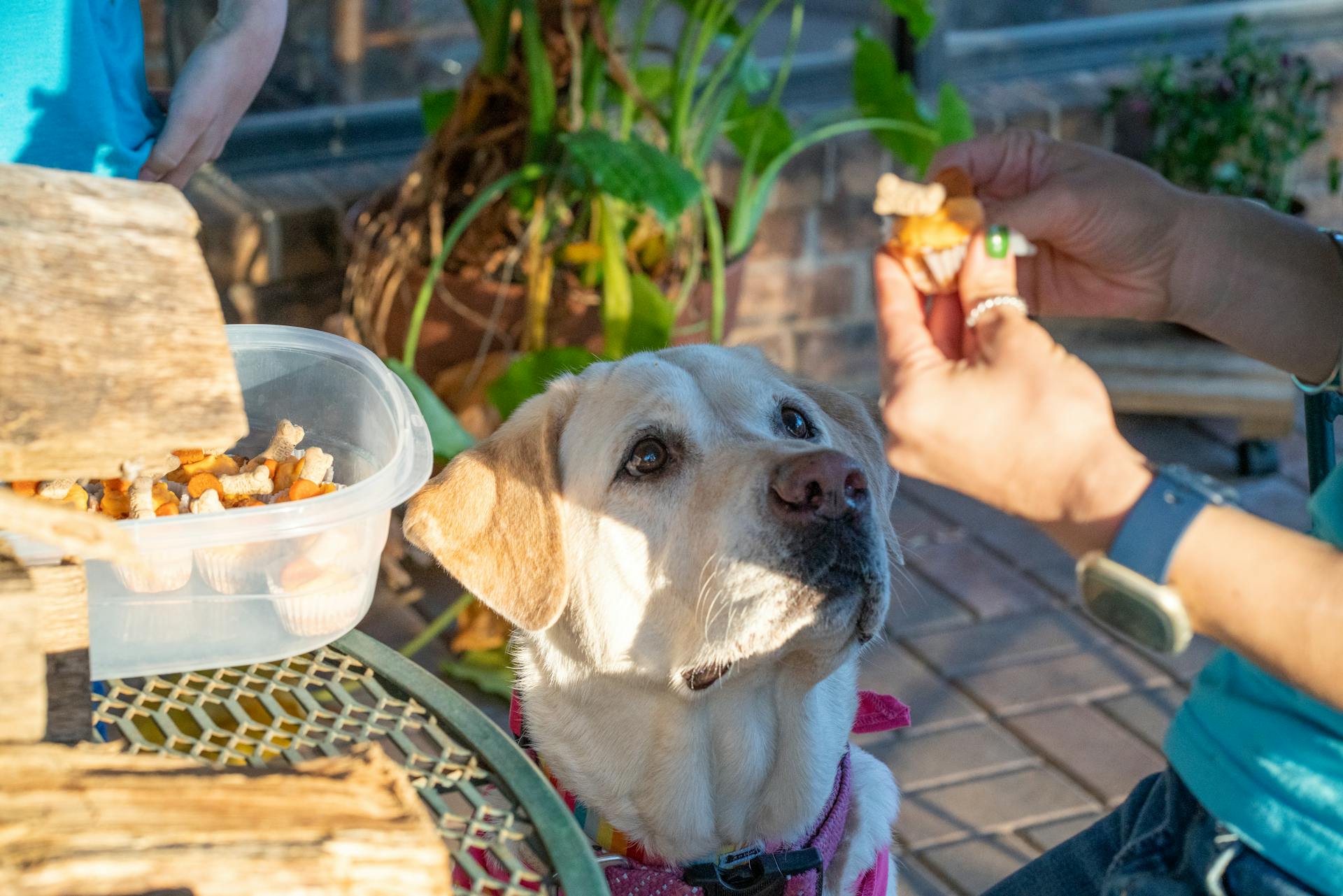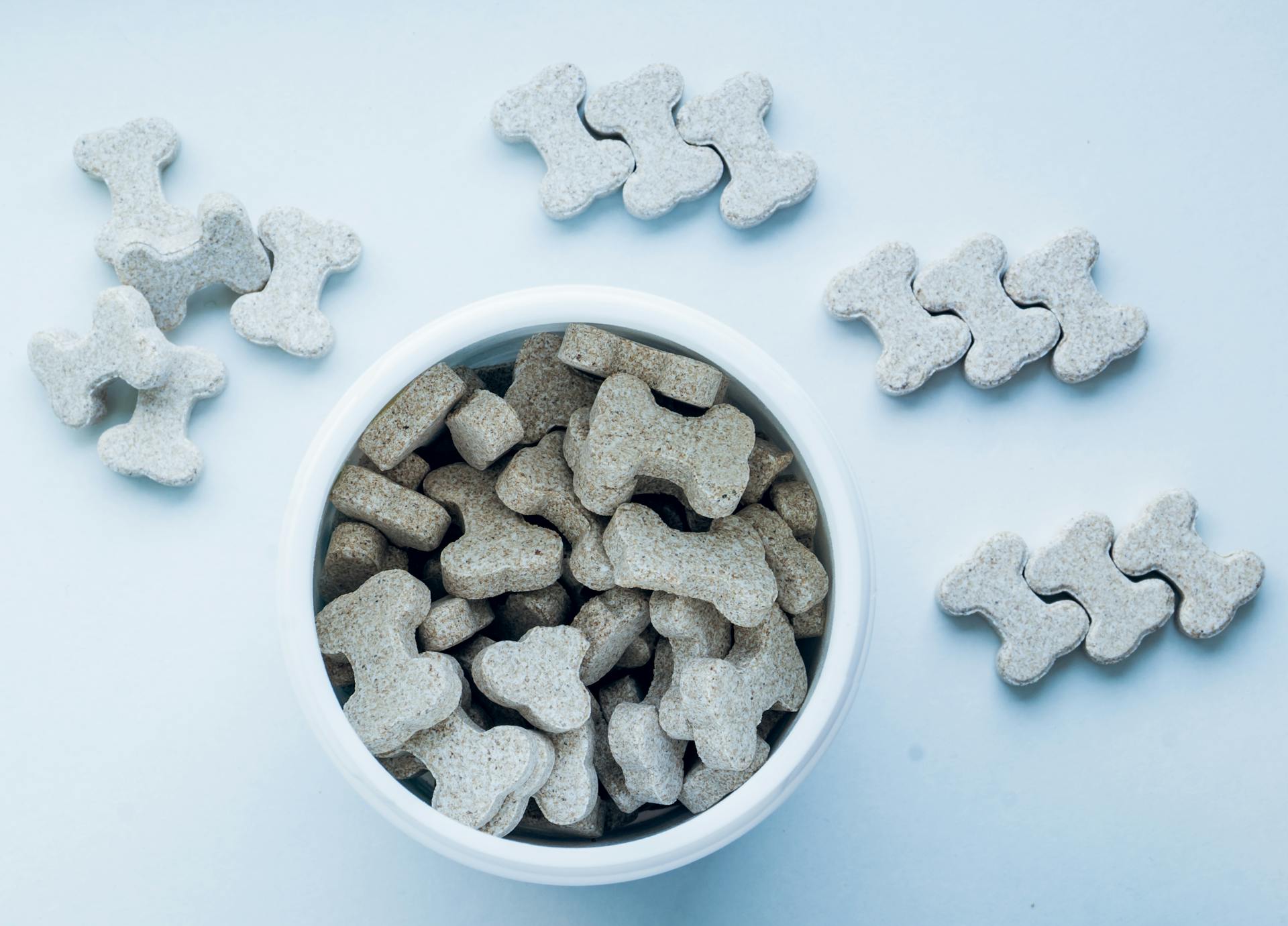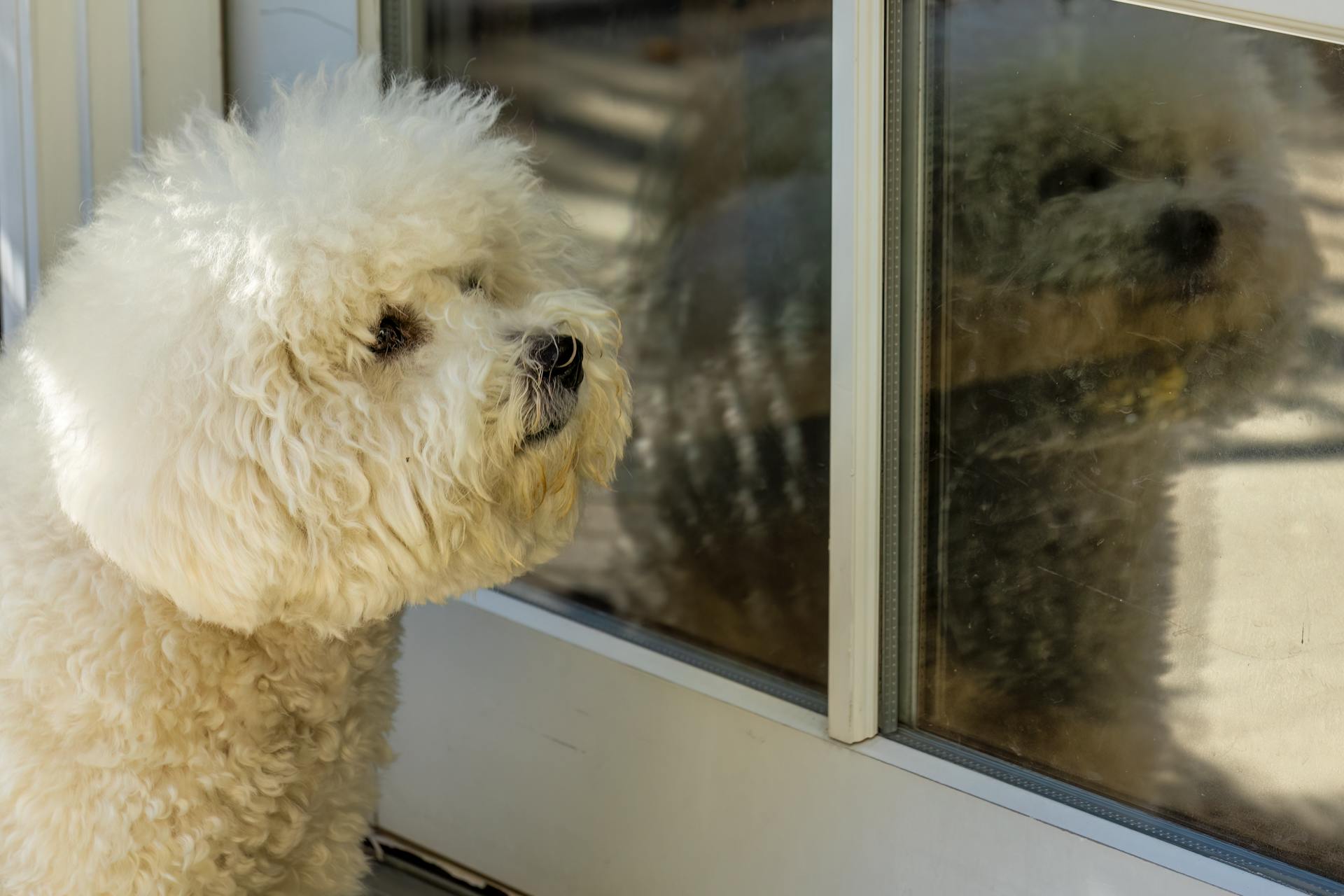
When choosing dog treats, it's essential to avoid certain ingredients that can be toxic or cause harm to your furry friend. One common ingredient to steer clear of is onions.
Onions contain a compound called N-propyl disulfide, which can cause damage to a dog's red blood cells, leading to anemia. This is a serious condition that can be life-threatening if left untreated.
Some dog treats may also contain xylitol, a sugar substitute commonly used in human products. Xylitol can cause a rapid drop in blood sugar and even liver failure in dogs.
Chocolate, while delicious for humans, is a no-go for dogs due to its high theobromine content. This can lead to vomiting, diarrhea, and an increased heart rate in dogs.
Ingredients to Avoid
Foods containing garlic, onion, chocolate, grapes, and raisins should never be given to dogs.
Table scraps are also a no-go, as they can be toxic or highly fattening. Fried foods, bread, and baked goods should be avoided due to their high sugar and fat content.
Propylene glycol is a synthetic compound that can be toxic to dogs in large amounts and cause allergic reactions. Glycerin, a sugar alcohol, can cause digestive problems and contribute to dental plaque and tartar in dogs.
Rendered fat is a highly processed ingredient that can contain impurities and contribute to obesity and other health problems. Farmed salmon can contain mercury, PCBs, and other fat-soluble toxins.
Propylene Glycol
Propylene glycol is a synthetic compound found in some commercial dog foods, used as a preservative and flavor enhancer. However, it has been linked to health problems in dogs, including anemia, liver damage, and even death.
Many countries have banned or restricted the use of propylene glycol in dog food, or tolerate it at much lower levels. It's best to opt for dog foods that use natural preservatives and flavor enhancers instead.
Propylene glycol can be toxic to cats, causing Heinz body anemia, and is not allowed as an ingredient in cat food. If you have cats in the house, it's best to avoid propylene glycol altogether.
Propylene glycol is not unique to dog food, it's also found in common processed products like cola, beer, margarine, cake mix, and flavored coffee.
You might like: Which of the following Organs Does a Dog Not Have?
Glycerin

Glycerin is a highly processed ingredient that provides little to no nutritional value for dogs.
Some dogs may have adverse reactions to glycerin, including digestive problems like diarrhea, vomiting, and flatulence.
Glycerin can contribute to the formation of dental plaque and tartar in dogs, which can lead to dental problems like cavities and gum disease over time.
It's often used as a filler to add bulk to dog food products without providing any meaningful nutrients.
Glycerin is a sticky substance that can adhere to the teeth and gums, making it hard to remove and leading to further dental issues.
Pea Protein
Pea protein is a common ingredient in many cheaper grain-free pet foods, but it's not as great as it seems. It contains 55% protein in its concentrated form, making it a cheap way to boost protein content.
Unfortunately, pea protein is not as complete in amino acids as animal proteins are. Its biological value is not as high, so your dog won't be able to use all of the protein within peas.

You should look at pea protein critically when you see it on the list of dog food ingredients. Dried peas, similar to split peas, are often used in dog foods, not the goodness of fresh peas in a pod.
If pea protein is high up in the ingredient list, especially within the first 7 dog food ingredients, it's a red flag. It could be a sign that the manufacturer is trying to make up for a lack of meat-based protein nutrition.
In general, it's best to avoid dog foods with pea protein high up in the list.
Meat Products
Meat products can be a tricky topic when it comes to dog food. Rendered meat and meat meals are commonly used in the pet food industry to convert low-cost protein sources into products that read well on the label or nutritional data table.
Some meat meals may contain low-quality ingredients like beaks, feet, and other animal parts that are not fit for human consumption. These ingredients can be diseased, from dead animals, or from expired meat sections in grocery stores.

Meat meals are often made by grinding up meat and bone, and then cooking and dehydrating the mixture to remove the moisture. This process can destroy the nutritional value of the meat and may even result in the formation of harmful substances like heterocyclic amines (HCAs) and polycyclic aromatic hydrocarbons (PAHs).
Meat meal is unhealthy waste product for dogs, and it's often unsafe and does more harm than good. Unlike cats, dogs have the ability to make sufficient taurine from meat protein and do not need it as an additive to their foods.
Low-cost meat meals should be avoided, and instead, you want to pick dog foods that have good protein ingredients. The ingredients of meat meal in dog food can be diseased, from dead animals, or from expired meat sections in grocery stores.
Discover more: Lamb Lung Treats Good
Farmed Salmon
Farmed salmon is a common ingredient in dog foods, but it can contain toxic substances like mercury and PCBs. These toxins can accumulate in a dog's body and cause harm.
Mercury is a known neurotoxin that can damage a dog's brain and nervous system. It's especially concerning for pregnant dogs or puppies.
PCBs, or polychlorinated biphenyls, are another type of toxin that can be found in farmed salmon. They've been linked to various health problems in dogs, including cancer and reproductive issues.
It's essential to choose dog foods that use wild-caught salmon or other safer alternatives to avoid these toxins.
Food Options to Avoid Certain Ingredients
Avoid giving your dog jerky treats and meat-like treats because they're high in fat and sodium.
Foods containing garlic, onion, chocolate, grapes, and raisins should never be given to dogs, as they're life-threatening and can cause serious issues.
Table scraps are not a good idea as treats, as they may be toxic or highly fattening.
Baked goods and fried foods should be avoided due to their high sugar and fat content.
As dogs age, they benefit from treats that support their joints and dental health.
If you're unsure about a specific treat, speak with your veterinarian for guidance.
Unhealthy Treats
High-fat and high-sodium treats, like jerky and meat-like treats, are best avoided.
Foods high in sugar and fat, such as cookies and cupcakes, are okay as an occasional treat, but not as a regular snack.
Table scraps are a no-go, as they can be toxic or highly fattening.
Foods containing garlic, onion, chocolate, grapes, and raisins are a hard no, as they're life-threatening to dogs.
Fried foods, bread, and baked goods are also off-limits due to their high sugar and fat content.
As dogs age, they benefit from treats that support their joints and dental health.
Artificial Additives
Artificial additives are a common ingredient in many dog treats, but they can be detrimental to your furry friend's health. Artificial colors and dyes, for example, have been linked to hyperactivity, skin irritation, and even cancer.
Studies have shown that artificial colors and dyes can cause a range of health problems in dogs, including cancer. These ingredients are often made from coal tar, a known carcinogen.
Many commercial dog treats contain artificial preservatives like BHA, BHT, and ethoxyquin, which have been linked to health problems such as cancer, kidney damage, and liver dysfunction. These preservatives are used to extend the shelf life of dog treats, but they can have serious consequences for your dog's health.
Artificial Additives
Artificial preservatives like BHA, BHT, and ethoxyquin are commonly used in dog food to extend shelf life, but they've been linked to health problems in dogs, including cancer, kidney damage, and liver dysfunction.
Many pet owners are now avoiding dog foods that contain these ingredients, opting for natural preservatives like Vitamin E or rosemary extract instead.
BHA and BHT have been linked to liver damage and cancer in dogs, while ethoxyquin has been linked to liver damage, immune system problems, and cancer.
Some artificial preservatives, like ethoxyquin, are also used as pesticides and herbicides, raising concerns about their safety.
Chemical preservatives in dog food, including ethoxyquin and others, have been linked to kidney failure in dogs in a study.
Artificial colors and dyes are often used in dog food to create an appealing appearance, but they can be harmful to your dog's health, causing hyperactivity, skin irritation, and cancer.
Artificial flavors and colors offer no nutritional value and have been linked to allergies, digestive problems, or even behavioral issues.
Here's a list of some common artificial additives to avoid in dog food:
- Artificial preservatives: BHA, BHT, ethoxyquin
- Artificial colors and dyes
- Artificial flavors
- Nitrites or nitrates (sodium nitrite)
- Coal tar-based artificial colors and dyes
Remember, it's always a good idea to read the ingredient label and avoid foods that contain artificial additives.
Rendered Fat
Rendered fat is a type of animal fat that's produced by boiling down raw animal tissue, and it's often used in commercial dog food formulas.
It's highly processed and can contain impurities that harm dogs, making it best to avoid foods with rendered fat.
Rendered fat is typically high in saturated fats, which can lead to obesity and other health problems in dogs.
Animal fat from rendered fat can come from unidentified animals, which may not be from the highest quality sourced.
This low-quality fat is often rancid and may contain toxins stored in animal fat, which can be detrimental to a dog's health.
Many toxins are stored in animal fat, and low-quality fats contain more fat-soluble toxins than more desirable descriptive fats.
Rendered fat from roadkill is sometimes used in animal feed, which means other questionable ingredients like non-descript flavors may be added to cover up the taste.
You want to opt for healthy fats from named sources, like chicken fat, for the best results.
Worth a look: How Often Should I Take My Dog Out?
MSG
MSG is a flavor enhancer commonly used in both human and dog food. It has no nutritional benefit and is often used to disguise low-quality ingredients.
MSG can cause trouble for humans and pets alike, and is a common food allergen in both species. It's also associated with different types of toxicity, including neurotoxic effects.
MSG doesn't have to appear on pet food ingredient labels, but you can often find it in ambiguous ingredients like yeast extract or autolyzed yeast. Dog owners should always pay attention to the ingredients and study each one in the mixture.
Avoiding MSG is a good idea, especially since it's linked to obesity, metabolic disorders, and other health problems. If you find evidence of MSG in your dog's food, it's a sign that the food contains low-quality ingredients.
Some common ingredients that may indicate the presence of MSG include autolyzed yeast, yeast extract, and hydrolyzed protein. These ingredients can be tricky to spot, but paying attention to the ingredient label is key to identifying bad ingredients in dog food.
Carrageenan
Carrageenan is a thickener and stabiliser commonly used in canned dog foods. It's been linked to digestive issues and even cancer in dogs.
Carrageenan has been found to be problematic in dog foods, so it's essential to choose a dog food that doesn't contain it. Look for natural thickeners and stabilisers instead.
If you're feeding your dog canned food, make sure to read the ingredient list carefully to avoid carrageenan. Your dog's health will thank you.
Xylitol
Xylitol can be deadly for pets, causing a surge in blood sugar followed by a drop that can lead to hyperglycemia, seizures, cancer, liver failure, and even toxicity.
Only xylitol is toxic to dogs, but other sugar substitutes in dog food do nothing for their nutritional needs and can make them crave sugar.
Always consider the glycemic index to determine your dog's sugar intake, and choose a dog food brand with healthy ingredients like naturally sweetened fruits and vegetables.
Xylitol has no nutritional value for dogs, so it's best to avoid it altogether.
Animal Digest
Animal Digest is a highly processed ingredient that's often used in dog food to add flavor. It's made from animal tissue scraps that are treated with heat, enzymes, and/or acids to form a concentrated flavor.
Animal digest is essentially a meat broth that's sprayed onto dog food to mask any unpleasant flavors. This is a problem because it can make up for a lack of actual meat flavor from, well, meat.
According to the FDA, a small amount of animal digest can produce a strong flavor, even if no actual meat is added to the food. This is why it's essential to read the ingredient label and avoid foods that contain animal digest.
Bad ingredients like animal digest can lead to digestive issues, allergies, and nutrient deficiencies in dogs. Paying attention to the ingredients in your dog's food is crucial for their overall health and well-being.
Melamine Controversy
Melamine is an industrial chemical that's not approved for use in animal or human foods in the United States, but it was found in pet food in 2007.
The contamination occurred because some Chinese dog food producers added melamine to their products to make it appear that their protein content was higher than it actually was.
Melamine can artificially increase the level of protein in food when tested using traditional methods, even though it has no nutritional value.
This is a major concern because when dogs consume food contaminated with melamine, it can lead to extensive harm, such as kidney damage, kidney failure, and even death.
Thousands of pets were affected by the contaminated food, and many pet food products were recalled in the aftermath of the scandal.
The FDA has not approved melamine as an ingredient in animal or human foods, so it's essential to choose high-quality, trusted dog food producers when purchasing pet food.
Here's a breakdown of the risks associated with melamine:
Since the scandal, there have been efforts to improve the safety and regulation of the pet food industry to prevent similar incidents from happening again.
Frequently Asked Questions
What is a safe preservative for dog treats?
We use natural preservatives like ginger, lemon, and oregano in our dog treats to keep them fresh and safe for consumption. These ingredients not only preserve food but also offer additional health benefits for your furry friend.
Sources
- https://www.walkinpets.com/blog/dog-food-ingredients-to-avoid/
- https://www.petmd.com/dog/nutrition/hazards-avoid-while-baking-homemade-dog-treats
- https://www.dogster.com/dog-nutrition/what-to-avoid-in-dog-food
- https://eurekapet.co/blogs/news/top-ingredients-to-avoid-in-dog-food
- https://blog.homesalive.ca/dog-blog/bad-dog-food-ingredients-to-avoid
Featured Images: pexels.com


